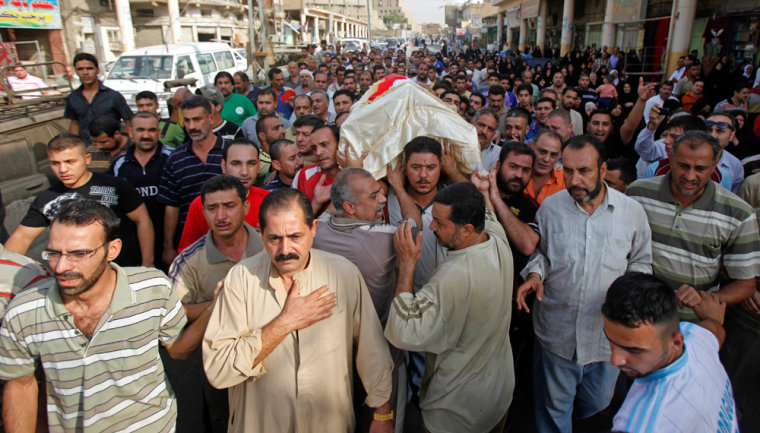The death toll from Iraq's worst attack in more than two years climbed to 155 Monday as Iraqis buried the dead from the twin suicide bombings that devastated the heart of Baghdad.
Funerals were held around the city amid heightened security that snarled traffic during the morning rush hour. The bombings targeted two government buildings, calling into question the state's ability to protect itself as it prepares for January elections and the U.S. military withdrawal.
"Sadness is overwhelming today in the office," said one government employee, who asked that her name not be used because she did not want to be reprimanded for speaking publicly about authorities. "It's as if we are sitting at a funeral in the office because many of our colleagues and people we know were killed."
The attacks targeted the Baghdad Provincial Administration building and the Justice Ministry, wounding hundreds of people, including three American contractors. Officials revised the number of wounded down to about 500 Monday, from 700 the day before. There have been no claims of responsibility or arrests so far.
'The fear inside of us'
Baghdad residents, heading for work on Monday, expressed concern that more such attacks would take place ahead of January's key elections.
"Today, we came to work despite the fear inside us," said Siham Abdul-Karim, 49, an employee in the Culture Ministry, located near the blasts.
Abdul-Karim said it took him two hours to get to the office since the streets around the capital were blocked and intense searches were taking place at police checkpoints.
The same checkpoints, however, couldn't stop Sunday's bombings, noted Abdul-Karim said. "We all wonder how could car bombs reach these institutions."
The initial investigation suggested the vehicles, each packed with explosives, might have passed through some security checkpoints before hitting their destination, said Maj. Gen. Qassim al-Mousawi, a spokesman for the city's operations command center.
The pickup truck that exploded near the Justice Ministry was carrying 2,205 pounds of explosives, the initial investigation found. The second pickup truck that went off near the Baghdad Provincial Administration building, was carrying 1,543 pounds of explosives.
The explosives were attached to the vehicles and hidden below the seats, al-Mousawi said.
The bombings showed that insurgents still have the ability to launch horrific attacks in the center of the capital even as violence has dropped dramatically across the country.
Iraqi health and security officials both confirmed the raised death toll. All officials spoke on condition of anonymity because they were not authorized to release information to the media.
Hallmark of Sunni insurgents
Massive car bombs have been the hallmark of the Sunni insurgents seeking to overthrow the country's Shiite-dominated government. Iraq has accused members of the outlawed Baath Party living in neighboring Syria of being behind another series of deadly bombings in August that also targeted government buildings and killed more than 100 people.
Iraqi Prime Minister Nouri al-Maliki, who has staked his political reputation and re-election bid on his ability to bring peace to the country, blamed Sunday's attacks on al-Qaida and supporters of the previous regime of Saddam Hussein.
He pledged to punish those responsible, who he said wanted to "spread chaos in the country, undermine the political process and prevent the holding of parliamentary elections."
The street where the blasts occurred had just been reopened to vehicle traffic six months ago. Shortly after, blast walls were repositioned to allow traffic closer to the government buildings — all measures part of changes hailed by al-Maliki as a sign that safety was returning to the city.
President Barack Obama, who earlier this week reaffirmed the U.S. commitment to withdrawing its troops from the country, called al-Maliki on Sunday to offer his condolences.
The coordinated bombings were the deadliest since a series of massive truck bombs in northern Iraq killed nearly 500 villagers from the minority Yazidi sect in August 2007. In Baghdad itself, it was the worst attack since a series of suicide bombings against Shiite neighborhoods in April 2007 killed 183.
More on: Iraq
